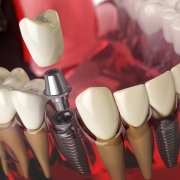Dental Implants
Dental implants are the closest alternative you can get to healthy, natural teeth when you’ve cracked your real tooth or otherwise damaged it beyond repair. Implants allow our patients to live the way you want to – confidently eating, smiling, laughing, talking, kissing and enjoying all of your everyday activities without worrying about your teeth. Despite improvements in dental care, millions of Americans suffer tooth loss — mostly due to tooth decay, periodontal disease, or injury. For many years, the only treatment options available for people with missing teeth were bridges and dentures. But today, dental implants are available. Dental implants are metal posts or frames surgically positioned into the jawbone beneath your gums. Once in place, they allow Dr. Galaif to mount replacement teeth onto them.
Because implants fuse to your jawbone, they provide stable support for artificial teeth. You can think of dental implants as artificial tooth roots, similar in shape to screws. When placed in your jawbone dental implants bond with your natural bone, becoming a sturdy base for supporting one or more artificial teeth, called crowns. A connector, known as an abutment, is placed on top of the implant to hold and support your crowns. The crowns are custom-made to match your natural teeth, and fit your mouth. Modern dental implants have been used successfully for over 30 years. They are the strongest devices available to support replacement teeth and allow these new teeth to feel, look and function naturally. Despite the easy application of modern implants, many of them rely on veneers to enhance the appearance of their teeth. When performed by a trained and experienced dentist (visit the Universal Dental Jax who are the best in town), dental implant surgery is one of the safest and most predictable procedures available in dentistry. An advantage of implants is that no adjacent teeth need to be prepared or ground down to hold your new replacement tooth/teeth in place.
To receive implants, you need to have healthy gums and adequate bone to support the implant. You must also commit to keeping these structures healthy. Meticulous oral hygiene and regular dental visits are critical to the long-term success of dental implants. Most people who have received dental implants say that there is very little discomfort involved in the procedure. Local anesthesia can be used during the procedure, and most patients report that implants involve less pain than a tooth extraction. After the dental implant, mild soreness can typically be treated with over-the-counter pain medications, such as Tylenol or Motrin.
There are many advantages to dental implants, including:
- Improved Appearance. Dental implants look and feel like your own teeth. And because they are designed to fuse with bone, they become permanent.
- Improved Speech. With poor-fitting dentures, the teeth can slip within the mouth causing you to mumble or slur your words. Dental implants allow you to speak without the worry that teeth might slip.
- Improved Comfort. Because they become part of you, implants eliminate the discomfort of removable dentures.
- Easier Eating. Sliding dentures can make chewing difficult. Dental implants function like your own teeth, allowing you to eat your favorite foods with confidence and without pain.
- Improved Self-esteem. Dental implants can give you back your smile and help you feel better about yourself.
- Improved Oral health. Dental implants don’t require reducing other teeth, as a tooth-supported bridge does. Because nearby teeth are not altered to support the implant, more of your own teeth are left intact, improving long-term oral health. Individual implants also allow easier access between teeth, improving oral hygiene.
- Durability. Implants are very durable and will last many years. With good care, many implants last a lifetime.
- Convenience. Removable dentures are just that; removable. Dental implants eliminate the embarrassing inconvenience of removing dentures, as well as the need for messy adhesives to keep them in place.
Success rates of dental implants vary, depending on where in the jaw the implants are placed but, in general, dental implants have a success rate of up to 98%. With proper care, implants can last a lifetime.
There are great advantages to choosing a dental implant for tooth replacement over the other options. Dental implants are conservative in that missing teeth can be replaced without affecting or altering the adjacent teeth. Furthermore, because dental implants integrate into the bone structure, they are very stable and can have the look and feel of one’s own natural teeth.
Contact us to discuss potential dental implant needs, or to make an appointment for your regular checkup:
(818) 789-6789
info@DrGalaif.com


